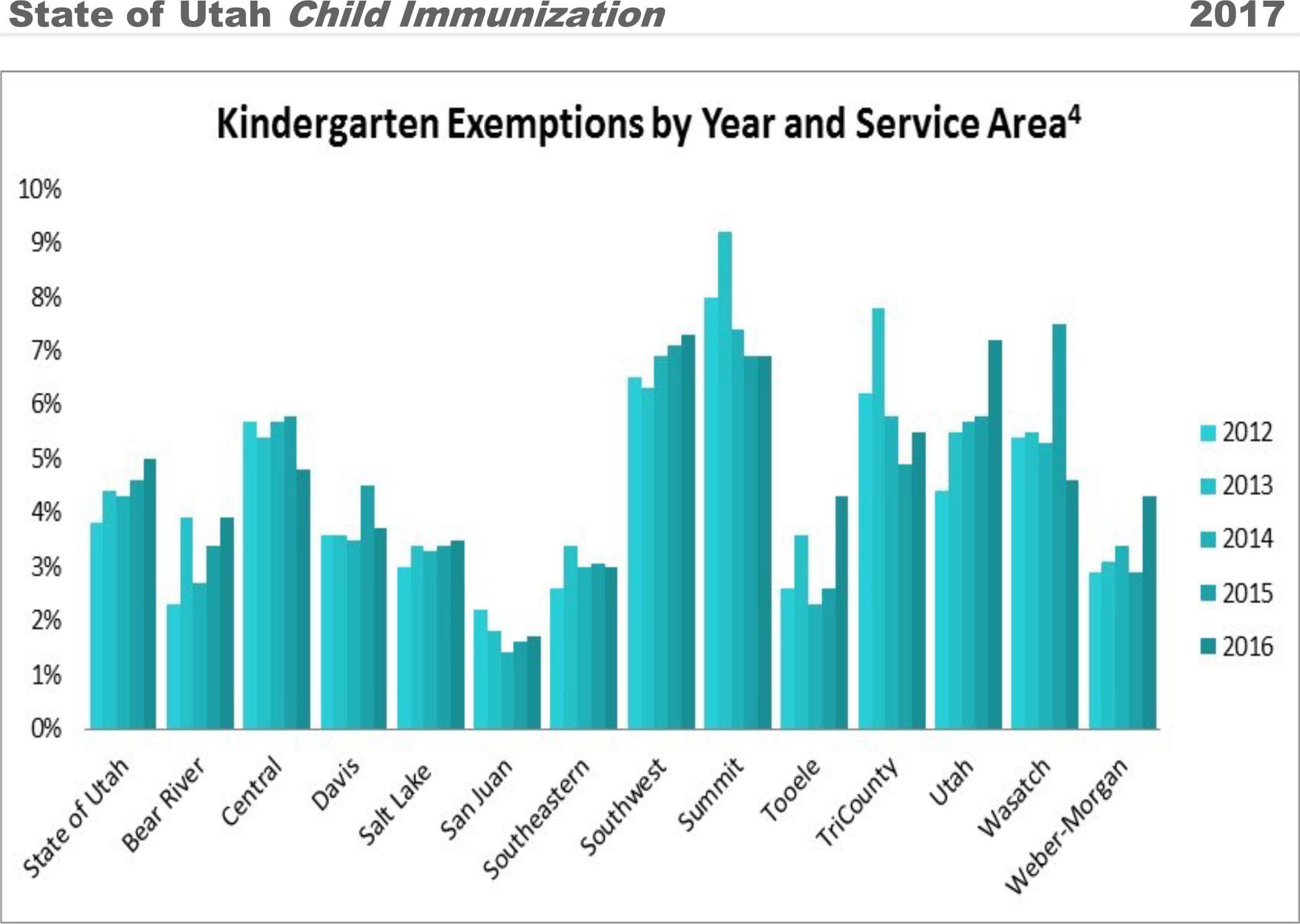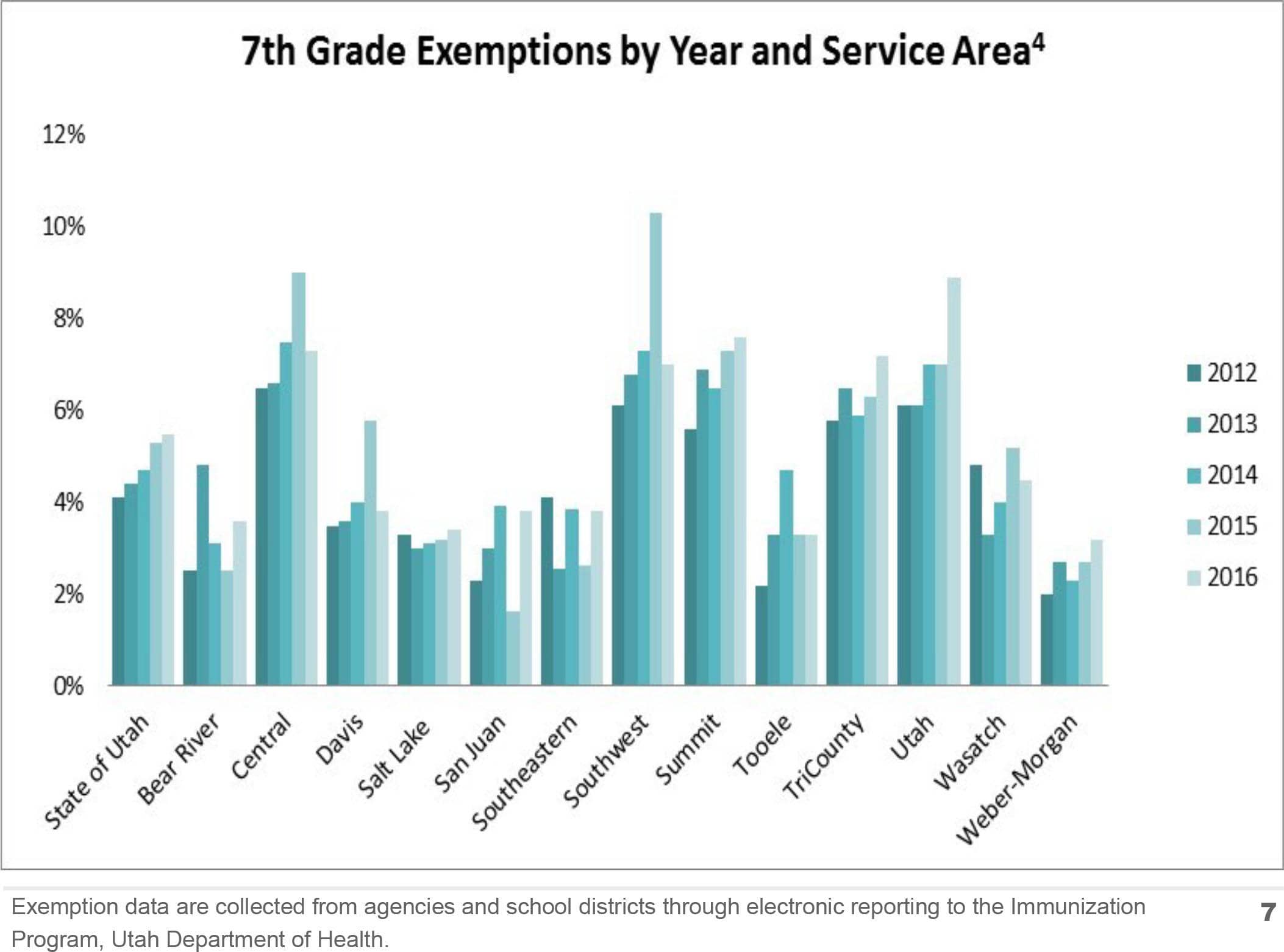In Utah, A New Approach To School Vaccine Waivers
4:39 minutes
 This segment is part of The State of Science, a series featuring science stories from public radio stations across the United States. A version of this story, by Erik Neumann, originally appeared on 90.1 KUER Public Radio in Salt Lake City, Utah.
This segment is part of The State of Science, a series featuring science stories from public radio stations across the United States. A version of this story, by Erik Neumann, originally appeared on 90.1 KUER Public Radio in Salt Lake City, Utah.
Measles is making a comeback in the U.S. as more parents choose not to vaccinate their children. The childhood disease is a major killer in much of the developing world, but now the public health community is trying to re-educate families about the importance of childhood vaccinations. That includes a new program in Utah.
In 2017, Republican Utah State Representative Norm Thurston was approached by people in his district. They wanted to make sure that parents who weren’t going to vaccinate their kids understood what that choice meant.
“I’m strongly pro-vaccination,” Thurston said. “I think that every child that can be vaccinated should be vaccinated.”
[Science Friday is headed to Salt Lake City on September 15, 2018 for a special staged show!]
Thurston represents Utah County. It’s an area of the state with some of the highest numbers of children who don’t get vaccinated for common childhood diseases like measles, whooping cough, and mumps. And while Thurston is pro-vaccination, he’s also pro-personal choice.
“For me it’s an important part of freedom is to be able to make that decision for yourself,” he said.

In the past, parents who wanted their kids exempt from vaccinations for medical, religious or philosophical reasons had to go to their county health clinic, talk to a nurse, and take a form to their child’s school. So, Thurston came up with a compromise. Now parents can stay at home and watch a program online about the importance of vaccinations instead.
The 20-minute long module covers the basics: It dispels vaccine myths and describes vaccine-preventable diseases and why childhood shots are important. It also explains the precautions parents need to take if they don’t get their kids vaccinated, like having them stay home from school if there’s a disease outbreak. A measles outbreak would mean an unvaccinated child must stay at home for 21 days, 26 days at home for mumps, etc.
The goal is to get parents consistent information. But some are still resistant and see the online program as patronizing.

Including Seth Cox, a parent in Utah County. He stopped vaccinating his five kids, he said, after hearing stories about children having allergic reactions. And when he took his kids to get vaccinated, he said it seemed like doctors relied more on scare tactics than answering his questions.
“‘Stop being such a scaredy-cat,’” Cox said, recalling the tone of their conversations. “And, ‘You’re putting everybody at risk, and your own children. You’re a terrible parent.’”
According to the CDC, severe allergic reactions to childhood vaccinations are extremely rare.
Despite that assurance, the number of parents around the country getting vaccine exemptions is growing, along with a rise in the infections those childhood shots are meant to prevent, according to Peter Hotez, a professor of pediatrics and dean of the National School of Tropical Medicine at Baylor College in Houston.
“These are scary diseases. I mean measles, before we did large-scale global programs, was the single leading killer of children in the world in the 1980s,” Hotez said.
“We’ve got counties now in the western part of the United States where you have schools where you have 10, 20, 30 percent of the kids are not receiving their childhood vaccines.”
According to a recent report Hotez co-authored, this trend means preventable diseases are again putting communities at risk.
“We’ve got counties now in the western part of the United States where you have schools where you have 10, 20, 30 percent of the kids are not receiving their childhood vaccines,” he said.
The spread of preventable diseases doesn’t just affect individual children whose parents choose not to get them immunized. These low vaccination rates interfere with a phenomenon known as “herd immunity,” the term doctors and researchers use to describe what happens when the vast majority of a community is vaccinated.
When a disease outbreak does occur, that mass vaccination makes it more difficult for infections to spread. Herd immunity is especially important for vulnerable people who can’t be vaccinated for medical reasons like having a weakened immune system in the case of people with cancer or HIV.
Rich Lakin is the immunization program manager at the Utah Department of Health. He said the effectiveness of vaccines in the U.S. has made it ironically difficult to convey their importance to some parents.
“It’s probably one of public health’s greatest achievements but it’s also our downfall. Now we have to fight for why immunizations are so important because we don’t see the diseases like we used to,” Lakin said.
[Have you ever had a tough conversation about vaccines? Use these facts.]
Lakin is not convinced that Utah’s new program is going to solve the problem of growing vaccine exemptions. It could make things worse since now parents can exempt their kids online rather than requiring a trip to the doctor’s office.
He knows personally how a childhood shot can change a life. Growing up, Lakin had an uncle with polio.
“I saw him all growing up,” Lakin said, “I remember him telling me ‘Man I wish that vaccine had come out a couple of years earlier.’”
He hopes the new information will be a reminder for parents about what’s at stake.
The online immunization module in Utah is now available for the coming school year.
Erik Neumann is a reporter for the Mountain West News Bureau at KUER. He’s based in Salt Lake City, Utah.
IRA FLATOW: Now it’s time to check in on the state of science.
SPEAKER 2: This is KERE. For WWNL.
SPEAKER 3: St. Louise public radio.
SPEAKER 4: Iowa public radio news.
IRA FLATOW: Local science stories of national significance. And for parents around the country, back to school often means a trip to the doctor. Sometimes a vaccine required by the school. Parents can seek an exemption from the required vaccines, either for medical or non-medical reasons. And nationwide, around 2% of students get some type of exemption. Today we’re broadcasting from KUER studios in Salt Lake City. And joining me now to talk about a change, and out of state of Utah manages such exemptions is Erik Neumann, reporter in KUER’s Mountain West news bureau. Welcome.
ERIK NEUMANN: Thanks.
IRA FLATOW: So what was the exemption policy before, and what is it now?
ERIK NEUMANN: The policy, the law that people can exempt their kids for a philosophical or personal belief is basically the same as what it was before. But where previously parents would have to say they wanted to get their kids exempt from getting vaccines go to the local county health department, get a note from a nurse. They may have to pay a fee.
The information that parents might be getting around the state was, kind of, variable, and so the Health Department here decided they should streamline all that and make it consistent. So they created this new education module that parents have to watch over the internet, and it kind of walks them through the risks of exempting their kids from getting vaccines. And talks about what they might have to do to keep their kids at home for a number of weeks if there’s an outbreak and things like that.
IRA FLATOW: So do they have to sign a document that says I have watched the, you know, the training module?
ERIK NEUMANN: My understanding is that it’s basically a click on the computer. I did the module myself, and didn’t do the final signing at the end. But it streamlines the process, and the hope is that it makes the information better. But some people are worried that it’s going to make it that much easier for parents that or much more convenient for parents that don’t want to get their kids.
IRA FLATOW: Yeah. You don’t need that doctor’s note anymore. You just watch the video and say you don’t want to do it for whatever reason. So give us an idea of what Utah’s vaccination numbers are like. Is there a particular problem in this state compared to the rest of the union.
ERIK NEUMANN: From the immunization folks that I’ve talked to at the Department of Health here, they’ve described Utah as being relatively in the middle. It’s not that our rates are extremely low for kids getting vaccinated, but there are certain pockets of the state that, sort of, are, I would say, representative of Utah’s libertarian political perspectives. Where there are a lot of parents who don’t vaccinate their kids.
And so some research that’s come out recently has identified certain counties in Utah that have such high rates of exemptions that they’re saying this could be at risk of vaccine preventable disease outbreaks if, you know, measles was introduced here. And you have a lot of kids in Utah. We have one of the highest birth rates in the country, and so it kind of sets us up for potential risks.
IRA FLATOW: So they’re betting that by watching the video, more education will be better for the vaccination program. But we don’t– do we know if there’s any science behind being more educated makes you want to get a vaccination?
ERIK NEUMANN: You know, it’s really hard to tell. I talked to one family who was not vaccinating their kids, and they were very informed about information about this. But they might be overstating the risks of their kid having an allergic reaction or something like that. So it sort of seems like a lot of the people that are already on this train of not wanting to have their kids vaccinated are pretty entrenched in their perspective. And so I think it’s going to take some time to see what effect this new module has.
IRA FLATOW: You know, it reflects the national trend. We see that in other places. Thank you Erik. Erik Neumann is a reporter in KUER Mountain west news bureau, and he was joining us today. We’re going to take a break, and when we come back, hurricane Florence has arrived to the Carolinas and it’s making its mark with a huge storm surge, heavy wind, and maybe the most important part of it is the rain. How climate change may be contributing to this double whammy of flooding. You got the surge in front of you, you got the rain behind you. What’s that doing to the land and the farming and acreage and all kinds of stuff. Well talk about it after the break. Stay with us.
Copyright © 2018 Science Friday Initiative. All rights reserved. Science Friday transcripts are produced on a tight deadline by 3Play Media. Fidelity to the original aired/published audio or video file might vary, and text might be updated or amended in the future. For the authoritative record of Science Friday’s programming, please visit the original aired/published recording. For terms of use and more information, visit our policies pages at http://www.sciencefriday.com/about/policies/
As Science Friday’s director and senior producer, Charles Bergquist channels the chaos of a live production studio into something sounding like a radio program. Favorite topics include planetary sciences, chemistry, materials, and shiny things with blinking lights.